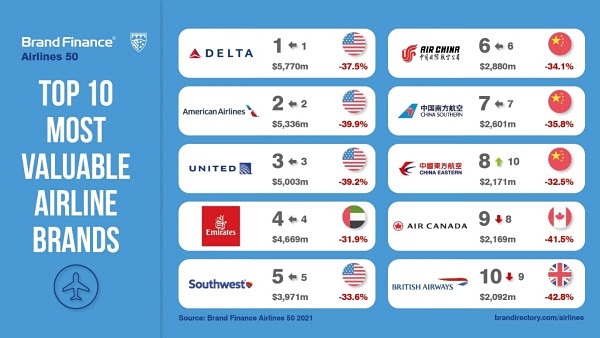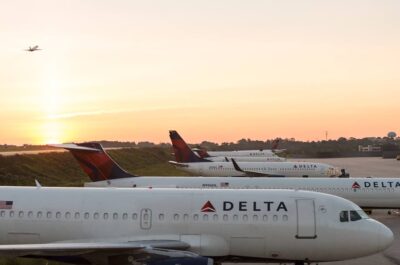Delta, American Airlines, and United Airlines have retained top three spots in Brand Finance Airlines 50 2021 ranking. Saudia is highest ranked new entrant in 39th; two other new entrants: Jetstar and Avianca.
The total value of the world’s top 50 most valuable airline brands has declined by a third, decreasing from US$108.6 billion in 2020 to US$72.9 billion in 2021, according to the latest Brand Finance Airlines 50 2021 report.
The airline sector is one of the most severely affected by the COVID-19 pandemic, with international travel at a near complete standstill since the beginning of 2020. With airlines forced to ground a significant amount of their fleets and cut flights down to worryingly low numbers, brands are grappling with depleting cash reserves and a dependence on government or state support.
The International Air Transport Association (IATA) has forecast that the industry will not make a full recovery to pre-pandemic levels until 2023 or 2024. According to Brand Finance’s analysis, low-cost airlines are predicted to make a quicker recovery than their full-service counterparts. Both, however, will be relying upon the continued speedy and successful rollout of vaccinations globally, as well as the effective control of new variants emerging. Business travel is expected to stagnate, while leisure travel is likely to be the main driver behind recovery across the industry.
Savio D’Souza, Valuation Director, Brand Finance, commented: “As predicted, airline brands have had a turbulent ride since the outbreak of the pandemic, with brand values plummeting across the board. With recovery closely tied to vaccination rates, we will likely witness short-haul flights and airline carriers rebound quicker compared to long-haul. Airlines that successfully manage to fly through the economic storm of the pandemic and protect their brands, are likely to be more resilient and perform better as we return to normality.”
No movement in top three
American airline brands, Delta, American Airlines, and United Airlines have retained the top three spots in the Brand Finance Airlines 50 2021 ranking. With all three brands exposed to the same business conditions throughout the pandemic in the US, their respective brand values have taken a similar hit, losing between 38% and 40%. Domestic travel in the US has already begun to steadily recover and over the summer months is expected to strengthen further, therefore brand values in the coming year should improve as a result.
The sector’s most valuable brand, Delta (brand value US$5.8 billion) has ensured that employees and customers have remained the top priority throughout the pandemic and has been recognised as a leading brand for customer service, communications, and flexibility – the latter of which is vital in the uncertain COVID environment.
Three new entrants
There are three new entrants into the ranking this year: Saudia (brand value US$506 million) in 39th; Jetstar (brand value US$360 million) in 49th; and Avianca (brand value US$356 million) in 50th.
Highest new entrant, Saudia, has weathered the COVID-induced storm by redirecting its resources to its strong domestic market. Saudi Arabia has recently revealed its vision for the kingdom to be a tourism and logistics hub with over 100 million tourists by 2030, increasing the number of destinations to 250 and doubling air cargo capacity.
Saudia plans to significantly increase its fleet size to capture this growth in the market. This expected domestic growth and ambitions of the Vision 2030 make the Saudia brand as one to watch as it builds its international brand strength and value.
Flag carriers build trust and reputation, but can they translate it to a commercial advantage?
In addition to measuring overall brand value, Brand Finance also determines the relative strength of brands through a balanced scorecard of metrics evaluating marketing investment, stakeholder equity, and business performance. Across the ranking, flag carriers on average receive both higher global and domestic Brand Strength Index (BSI) scores. In Brand Finance’s latest Global Brand Equity Monitor, flag carriers outperform non-flag carriers on two key metrics of recommendation by 16 points and reputation by 12 points.
Flag carriers, in general, have benefitted from greater state support than their non-flag carrier counterparts. This has taken place in direct financial support, as well as through indirect support through furlough schemes, jobs, or tax deferrals. They have also kept flying during the pandemic on vital routes while lower-cost peers have been forced to shut routes. This has helped bolster trust and reputation of flag carrier brands.
Aeroflot flies high as sector’s strongest
According to Brand Finance’s Brand Strength Index, Aeroflot (down 38% to US$1.0 billion) is once again the world’s strongest airline brand, with a BSI score of 89.5 out of 100 and a corresponding AAA brand strength rating.
Aeroflot has recently undertaken a shift in strategy towards becoming a more premium class travel option. As many other major airlines are being forced to make cuts in capital expenditure and suspend aircraft deliveries, Aeroflot is awaiting new generation aircrafts to gradually replace its older fleet.
As one of the oldest airlines in the world, Russia’s national flag carrier has clearly demonstrated that despite reduced air travel it continues to have a strong presence in consumers’ mind, with its reputation improving from 84.0 to 90.0 out of 100 this year, according to Brand Finance’s Global Brand Equity Monitor.
Savio D’Souza, Valuation Director, Brand Finance, commented: “Once again, Aeroflot has been named the world’s strongest airline brand. The airline’s strong and vast heritage, paired with its constant strive to innovate and improve its strategy, stand it in good stead to put itself in a solid position in the global airlines market once international travel restrictions ease.”
View the full Brand Finance Airlines 50 2021 report here.
Vicky is the co-founder of TravelDailyNews Media Network where she is the Editor-in Chief. She is also responsible for the daily operation and the financial policy. She holds a Bachelor's degree in Tourism Business Administration from the Technical University of Athens and a Master in Business Administration (MBA) from the University of Wales.
She has many years of both academic and industrial experience within the travel industry. She has written/edited numerous articles in various tourism magazines.
































































































































































































